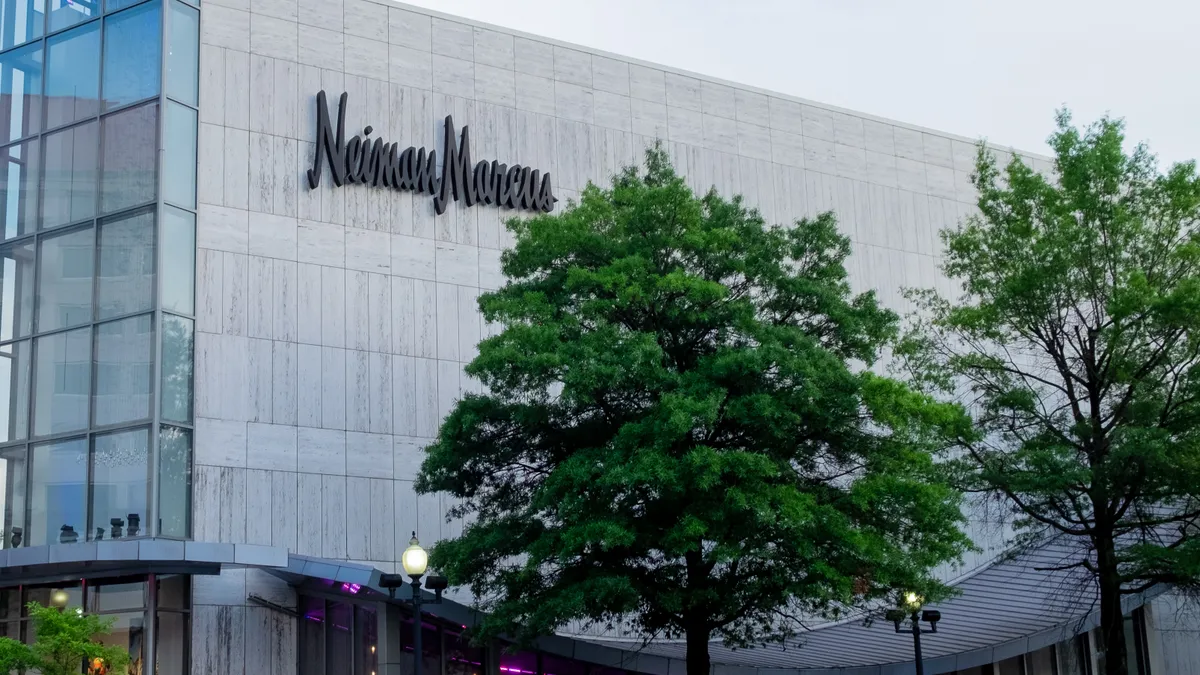Dive Brief:
-
While Neiman Marcus Group has exited bankruptcy with lower funded debt, it nevertheless "faces a challenging path to recovery from the ongoing secular pressures that the COVID-19 pandemic has amplified," S&P Global Ratings analysts said Thursday.
-
According to their emailed press release, analysts Cameron Bybee and Helena Song assigned Neiman Marcus a CCC+ issuer credit rating, with a negative outlook, and a CCC+ issue-level rating to its $750 million senior secured exit financing facilities (including a $699.2 million term loan and $50.8 million of notes) and a '3' recovery rating.
-
The negative outlook reflects their expectation that Neiman Marcus will remain under pressure through its 2021 fiscal year (ending next August), with revenues "declining in the mid- to high-single-digit range," and for "sustained high leverage and weak cash flows through fiscal 2022."
Dive Insight:
Neiman Marcus has made a clear choice to focus on e-commerce, an emphasis that predated the pandemic but seems to have only grown.
The company recently revealed a reorganization of its "store associate structure" at both Neiman Marcus and Bergdorf Goodman, with plans to lay off selling and non-selling associates, but also said it was adding jobs related to its digital operations.
While it was still in Chapter 11, the company unveiled a virtual hub offering "luxury services and experiences" and replaced its Fall Book with a digital campaign. Its foray into luxury e-commerce hasn't been entirely smooth, considering the years-long agitation around the MyTheresa luxury site, which continued through this summer.
But of concern to S&P is the pandemic's effect on its brick-and-mortar sales, with analysts saying its e-commerce operation isn't quite ready to offset the pressure on that channel.
"We believe the company will struggle to drive substantial in-store traffic over the next 12 months given consumer concerns surrounding health and safety and ongoing efforts to social distance," they wrote. "Though the company has meaningful online presence, which we expect to perform much better than in-store revenues, it only represents a third of total sales and will not make up for sales lost at brick-and-mortar locations."
And then there's the trajectory of the pandemic, which is set to linger through the holiday season into next year, they warned. A second wave would mean more social distancing and possibly more temporary store closures and therefore more lag in recovery for Neiman.
Furthermore, its luxury stance, which the department store also recently underscored when it largely dismantled its Last Call off-price fleet, could also be shaken by the recession. Earlier this year, Bain & Co. noted the global luxury market declined by about 25% in the first quarter and forecast a contraction of 20% to 35% for the year.
"[W]e expect the greatly weakened macroeconomic environment will add more pressure to high-end discretionary purchases, including luxury clothing and accessories," the S&P analysts said on Thursday. "In our view, we believe the U.S. luxury market could remain weak even after pandemic subsides as consumers shift spending toward other categories."















